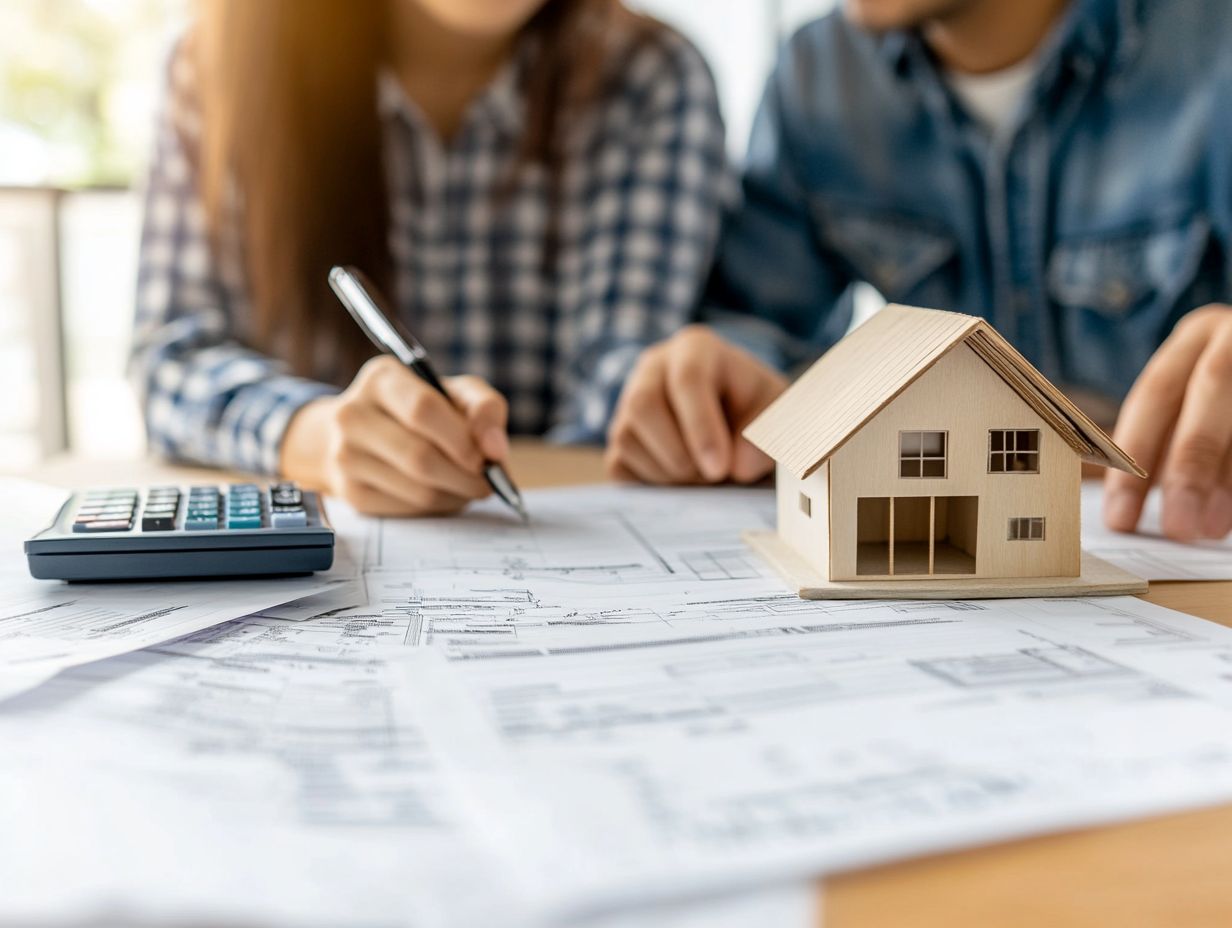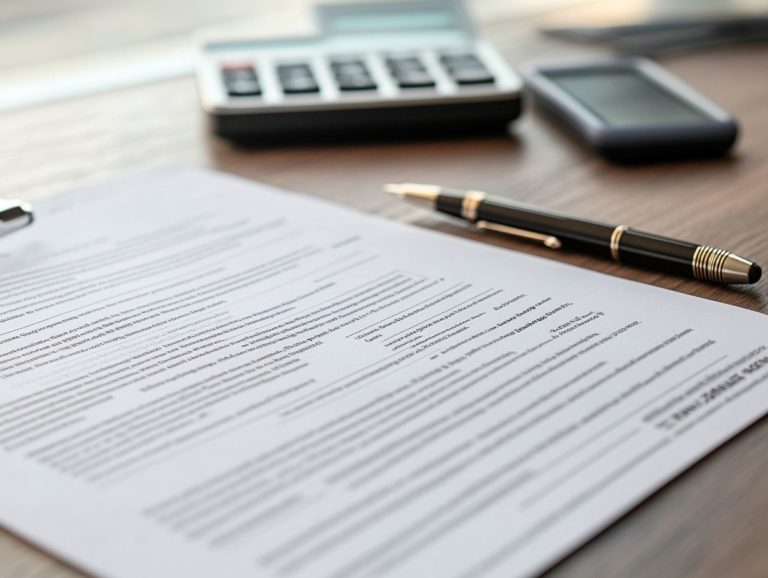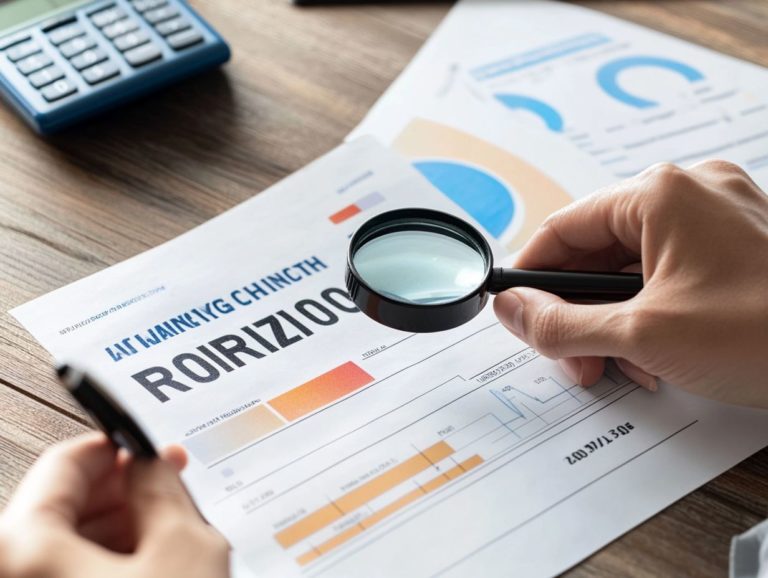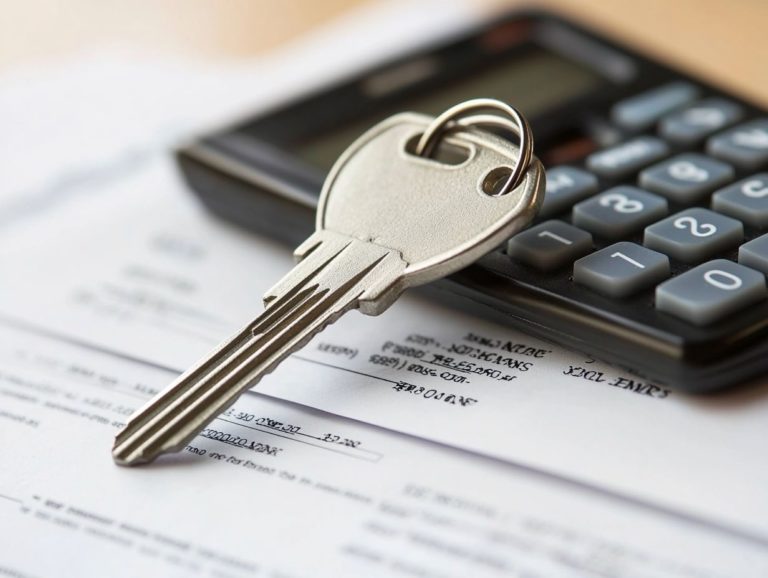The Role of Down Payments in Home Buying
When it comes to buying a home, understanding down payments is essential.
This article explores what down payments are and why they matter, highlighting their impact on your mortgage payments and your loan eligibility. You ll discover key factors to consider as you determine the ideal down payment for your situation, including effective saving strategies and alternative funding sources.
You ll find valuable tips on how to negotiate the down payment with sellers. Get ready to confidently navigate your home-buying journey!
Contents
- Key Takeaways:
- Understanding Down Payments
- How Down Payments Affect Home Buying
- Factors to Consider When Deciding on a Down Payment
- Options for Making a Down Payment
- Negotiating the Down Payment
- Preguntas Frecuentes
- Cu l es el papel de los pagos iniciales en la compra de una casa?
- Cu nto se requiere t picamente para un pago inicial?
- Cu les son los beneficios de tener un pago inicial m s grande?
- Puede un pago inicial afectar el tipo de hipoteca que un comprador puede obtener?
- Existen programas de asistencia para pagos iniciales disponibles para compradores de vivienda?
- Existen situaciones en las que puede no ser necesario un pago inicial?
Key Takeaways:

- A down payment is a crucial part of the home buying process, as it impacts mortgage payments and qualifying for a mortgage.
- Your personal financial situation and market conditions should be carefully considered when deciding on a down payment amount.
- Options for making a down payment include saving and alternative funding sources, and negotiating the down payment may be possible with sellers.
Understanding Down Payments
Understanding down payments is essential in your home buying journey, as it significantly affects your overall financial stability. A down payment is the upfront portion of the home purchase price that you must pay, and it plays a pivotal role in securing a mortgage loan.
The amount you choose to put down can influence your mortgage options, affect loan approval, impact interest rates, and even determine whether you ll need private mortgage insurance (PMI). PMI is insurance that protects lenders if you stop making payments on your loan. Knowing the importance of down payments in real estate transactions is vital for making informed decisions.
Definition and Importance
A down payment is a crucial initial investment made when you purchase a home, usually represented as a percentage of the total home price. This upfront contribution plays a pivotal role in the mortgage process, impacting both your loan approval and the terms that come with it.
Typically, making a larger down payment can lead to lower interest rates, which ultimately reduces your monthly payments and lessens your overall financial burden. Lenders often see substantial down payments as a mark of financial stability and responsible borrowing, increasing your chances of securing favorable loan conditions.
Meeting the down payment requirement boosts your equity in the home right from the start, providing a safety net against market fluctuations and laying a solid foundation for your future financial endeavors.
How Down Payments Affect Home Buying
Down payments are crucial in the home buying journey, impacting not just your monthly mortgage payments but also the overall loan amounts and the role of mortgage rates you encounter.
Understanding their significance empowers you to make informed financial decisions as you navigate this important milestone.
Impact on Mortgage Payments
The size of your down payment plays a crucial role in shaping your monthly mortgage payments and the total cost of your mortgage over time.
When you choose to make a larger down payment, you effectively lower the loan amount you need, which translates into reduced monthly payments. This decrease in your overall loan amount positively affects your loan-to-value ratio, potentially paving the way for better interest rates.
Lenders often perceive a larger down payment as a sign of reduced risk, making them more willing to offer you favorable terms. With a smaller principal amount, the amortization process becomes more manageable, allowing you to pay off your mortgage sooner and with less interest throughout the life of the loan.
Take the next step in your home buying journey by contacting a mortgage advisor or using a mortgage calculator today!
Qualifying for a Mortgage

Your down payment size, credit score, and debt-to-income ratio impact your mortgage qualification. A larger down payment can enhance your chances of loan approval by reducing the lender’s risk.
Lenders assess various factors when evaluating you as a potential borrower. They pay close attention to your ability to manage debt and your overall creditworthiness.
For example, making a down payment of 20% or more not only lowers your monthly mortgage insurance costs but often opens doors to more favorable loan programs, such as conventional loans.
If you choose a smaller down payment, FHA loans may be more accessible, though they typically come with stricter credit score requirements.
Ultimately, the amount you save for a down payment plays a crucial role in determining both the type of financing available to you and the overall cost of homeownership.
Factors to Consider When Deciding on a Down Payment
When determining the ideal down payment, consider your personal financial situation, available cash reserves, and current market conditions.
Personal Financial Situation
Your financial situation heavily influences how much you can afford for a down payment. Key factors include cash reserves, outstanding debts, and overall credit score.
Cash reserves act as a safety net, affecting both your down payment ability and how lenders perceive your financial stability. Existing debts can limit your borrowing capacity, making it vital to assess your debt-to-income ratio.
A strong credit score can lead to favorable loan terms, possibly allowing for a lower down payment option.
For potential homebuyers, effective financial planning tips include:
- Maintain a budget
- Trim unnecessary expenses
- Regularly review your credit report to enhance your score
By addressing these elements, you can approach your down payment decision with greater clarity and confidence.
Market Conditions
Understanding market trends is crucial. Home prices and property appreciation rates influence your down payment strategy.
In a thriving market where property values are climbing, a larger down payment could be beneficial. This might unlock better loan terms and lower monthly payments, allowing for greater financial flexibility.
If the market shows signs of stagnation or decline, opting for a smaller down payment can act as a safety net, giving you the ability to adjust if prices drop.
By evaluating current trends in interest rates, location-specific demand, and economic forecasts, you can make informed decisions that enhance both your immediate affordability and long-term returns.
Options for Making a Down Payment
Options include personal savings, alternative funding, and government assistance programs. Each choice presents unique benefits tailored to your financial situation.
Saving for a Down Payment

Saving for a down payment requires careful financial planning and disciplined budgeting. While this journey may seem overwhelming, breaking it into manageable steps can make it achievable.
- Open a dedicated savings account for this purpose to keep those funds separate from everyday expenses.
- Automate transfers from your checking account to this savings account to grow your balance over time without constant attention.
- Regularly review and adjust your monthly contributions to align your savings with personal financial goals.
Alternative Funding Sources
You can explore a variety of alternative funding sources to help meet down payment requirements, including down payment assistance programs offered by financial institutions. These resources can ease your financial worries and significantly alleviate the burden that often accompanies purchasing a home.
For example, grants from local governments or nonprofit organizations can provide a valuable boost, requiring no repayment at all.
Low-interest loans made for first-time buyers offer flexible options that can adapt to your unique financial situation.
Family contributions also play a pivotal role. Loved ones may be willing to assist with the down payment or closing costs, making the dream of homeownership more attainable.
By considering these diverse funding options, you can greatly enhance your prospects of successfully stepping into your new residence. Don’t miss the chance to explore these funding options they can help you buy your dream home today!
Negotiating the Down Payment
Negotiating the down payment is a crucial aspect of the real estate transaction, significantly influencing the overall home price and the terms of the sale. Mastering this negotiation can empower you to secure more favorable conditions, ultimately shaping your home-buying experience to your advantage.
Tips for Negotiating with Sellers
When negotiating with sellers, having a clear understanding of your down payment options can greatly enhance your bargaining position. Being well-versed in current market conditions is essential, as it gives you the power to tailor your offers strategically.
Begin by researching comparable sales in the area. This insight can reveal just how flexible sellers might be with their terms.
In your communications with sellers, express genuine interest in their property while clearly outlining your financial capabilities. This delicate balance fosters rapport and encourages sellers to consider your proposal more seriously.
If the market favors buyers, don’t hesitate to leverage that to your advantage. Highlighting favorable conditions can persuade sellers to be more accommodating with the down payment arrangements.
Preguntas Frecuentes
Cu l es el papel de los pagos iniciales en la compra de una casa?
Los pagos iniciales son un aspecto crucial del proceso de compra de una casa, ya que representan el pago inicial realizado por el comprador hacia el precio de compra de la casa.
Cu nto se requiere t picamente para un pago inicial?
La cantidad requerida para un pago inicial puede variar seg n factores como el tipo de hipoteca, el prestamista y el puntaje de cr dito del comprador. Sin embargo, generalmente se recomienda tener un pago inicial de al menos el 20% del precio de compra de la casa.
Cu les son los beneficios de tener un pago inicial m s grande?
Un pago inicial m s grande puede tener varios beneficios. Incluye una tasa de inter s m s baja, pagos mensuales de hipoteca m s bajos y un costo total reducido de la casa debido a menos intereses pagados a lo largo del tiempo.
Puede un pago inicial afectar el tipo de hipoteca que un comprador puede obtener?
S , la cantidad del pago inicial puede impactar el tipo de hipoteca que un comprador puede obtener. Un pago inicial m s grande puede permitir condiciones de pr stamo m s favorables, como una tasa de inter s m s baja o un per odo de reembolso m s corto.
Existen programas de asistencia para pagos iniciales disponibles para compradores de vivienda?
S , hay varios programas de asistencia para pagos iniciales disponibles para compradores de vivienda elegibles. Estos programas pueden proporcionar ayuda financiera u ofrecer pr stamos para ayudar a cubrir el monto del pago inicial.
Existen situaciones en las que puede no ser necesario un pago inicial?
En algunos casos, un pago inicial puede no ser necesario. Por ejemplo, algunos pr stamos asegurados por el gobierno o opciones de financiamiento especiales pueden permitir un pago inicial m s bajo o sin pago inicial. Sin embargo, es importante considerar las posibles implicaciones de no tener un pago inicial, como tasas de inter s m s altas o pagos mensuales m s grandes.







